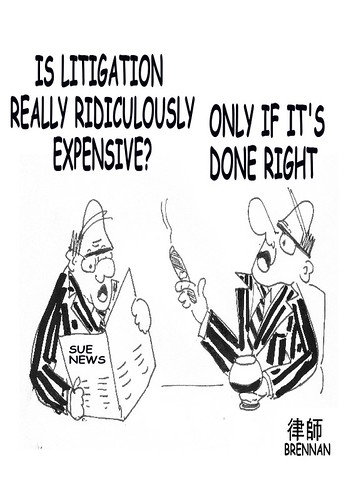You know that litigation could be expensive. If your attorney is a Linchpin he will always present an analysis of the costs of defending a lawsuit to you. Great attorneys are often able to limit the costs of litigation while continuing to defend you aggressively. Bad attorneys make lots of money by drafting unnecessary motions.
Some judges don’t allow for discovery motions, preferring issues such as the re-scheduling of depositions to be resolved at a conference. “Snake” attorneys will make the motion anyway, viewing it as a billing opportunity.
If you are subject to a lawsuit, one of the tools in your lawyers’ toolbox is a motion to dismiss. If you win a motion to dismiss, your case is over in one sweeping step. However, if you lose and your motion is denied, your litigation costs become more expensive. The rule outlining a motion to dismiss is CPLR section 3211. Because of its costs, the decision of whether you should make a motion to dismiss should not be taken lightly.
What should you look for when making a motion to dismiss?
- You should first review and pick apart the complaint.
- Does the plaintiff (the person who is suing you) state a cause of action?
- Are there any legal defects to the complaint?
- Does the complaint make factual sense?
- Do you have all the facts? In many cases, you need paperwork from the plaintiff, such as a contract.
- Does the court have the right to hear the case?
- Are you or your company subject to the court’s jurisdiction? For example, if your company is being sued in New York but has never conducted business there, a motion to dismiss could be appropriate.
- Statute of Limitations. The action may not have been timely filed.
What you need to tell your Attorney
- If you company has been sued, find out the person who has the most knowledge regarding the lawsuit.
- Write a detailed summary of the facts
- Notify him of any witnesses with their address, email address, Twitter account and phone number.
- Provide all documents related to the lawsuit.
When is winning a motion to dismiss a waste of time and money?
Just because a motion to dismiss can be made, doesn’t mean that it should. There are times when winning a motion to dismiss will not dispose of the case
- If you were improperly served, but the case is still well within the statute of limitations, the plaintiff can simply re-serve you.
- If there is a technical defect which can be easily changed by an amended pleading, such as the misspelling of your name?
- In some instances, by making a motion to dismiss you may alert the plaintiff of your defenses or missing information.
When should you make a motion to dismiss even if you will probably lose?
- For tactical reasons, you may decide to show the opposition that you are ready to go to war.
- You can obtain facts about the case earlier than waiting for formal discovery, which could take years.
As a defendant, you should always look to settle the case before a motion dismiss is made or an answer is filed. The vast majority of cases are settled before trial. Everyone is aware that the settlement is not a sign of weakness because of the high cost of litigation.
If you or your company has been subject to a lawsuit, contact me at the Law Office of Frederic R. Abramson at 212-233-0666.



